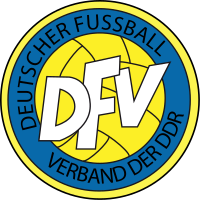DFV football resolution
The DFV football resolutions of 1970 and 1983 were far-reaching reforms in the German Football Association of the GDR within the GDR Oberliga , GDR League and the fifteen district leagues . In both resolutions, the DFV reacted to the falling level of play, which led to the strengthening of the football clubs (GDR) and the weakening of company sports communities .
Football decision of 1970
The main points of the decision of 1970 were the final separation of the focus clubs from the companies with the subsequent supervision by the DTSB and DFV. Strict financial framework conditions were imposed on the company sports associations and their sponsoring companies for higher-class football, which made the BSG de facto no longer competitive until 1989. Stahl Eisenhüttenstadt had already paid its players too high salaries and bonuses in 1970/71, and according to the DFV, thereby gaining unjustified advantages. Activist Schwarze Pump and Chemie Wolfen were also demoted to the district league after financial irregularities and were declared as forced relegators.
Another key point of the fundamental decision was the withdrawal of game permits for players with western relatives for the GDR Oberliga. This was consistently applied , among others, by Ralf Heine , Peter Zierau , Detlef Zimmer and Christoph Ringk . The common practice of calling up players for the NVA was also changed . While the clubs were largely spared of this with the decision of 1970, players were permanently withdrawn from company sports communities. Not infrequently, these were called up specifically to strengthen various army sports communities in the army service.
With the concentration and promotion of the clubs, the decision brought about a certain consolidation and increase in quality at the level of the GDR Oberliga. This was also reflected in the success of the teams in the European Cup. In the 1970s , the GDR teams regularly reached the quarter-finals or semi-finals and were also able to prevail against well-known opponents from Italy and England. 1. FC Magdeburg , Carl Zeiss Jena and Dynamo Dresden in particular increased the international reputation of GDR club football, with Magdeburg's victory in the 1974 European Cup Winners' Cup being the greatest success. This also had an impact on the GDR's national soccer team , which for the first time participated in the 1974 World Cup and won the 1976 Summer Olympics .
Football decision of 1983
At the beginning of the eighties, GDR football sank back into mediocrity. The reason for the second football decision in 1983 was the renewed failure of the national team for the 1982 World Cup in Spain and the elimination of all GDR clubs in the first main round of the 1982/83 European Cup. The decision focused mainly on the promotion of young talent as well as the completely inflated substructure of the GDR league with the five seasons . As early as the 1984/85 season, the GDR league returned to two seasons after thirteen years. The teams in the junior league were classified as the second teams in the district leagues and also had the right to promotion to the GDR league, while the junior league was continued. In order to promote German players, foreign players were no longer allowed to play in the second-class league from 1984 onwards, so that the main lender SASK Elstal only loaned its players to the third-class district leagues .
The second decision, which existed until 1989, could no longer build on the successes of the first reforms of 1970. In 1987 1. FC Lokomotive Leipzig reached the final of the European Cup Winners' Cup, and the national team once again missed qualifying for the 1990 World Cup .
literature
- Hanns Leske : Encyclopedia of GDR football . Verlag Die Werkstatt, Göttingen 2007, ISBN 978-3-89533-556-3 .
